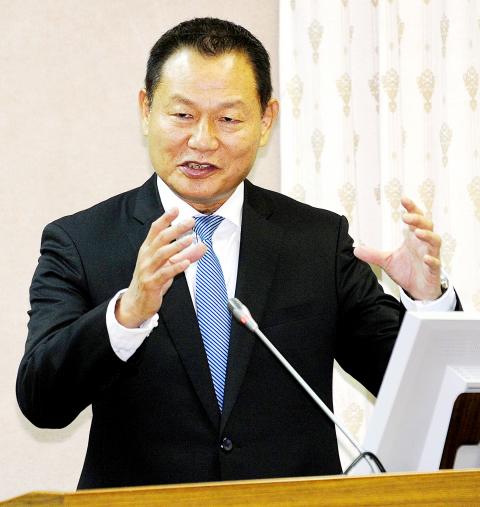China has been escalating its cyberwarfare against Taiwan, using an army of 180,000 cyberspies and more sophisticated methods to hack and steal information from government agencies and industries, the National Security Bureau (NSB) said in a report to the legislature yesterday.
The report said that this “cyberarmy” works at the Chinese People’s Liberation Army’s (PLA) General Staff Headquarters and its seven regional command centers, as well as national defense research and development agencies, state research centers and major universities.
“All our government and military agencies, industrial facilities, science and technology centers are vulnerable and under increasing attack by Chinese cyberwarfare,” NSB Director-General Lee Shying-jow (李翔宙) said.

Photo: Chen Chih-chu, Taipei Times
Taking his agency as an example, Lee said the bureau’s Web site detected 7.226 million hacking incidents last year, including 238,764 malicious attacks.
That is more than double the figure of 3.44 million hacking attempts (70,000 malicious attacks) found in 2012, bureau officials told lawmakers during a question-and-answer session in April last year.
Lee and bureau officials confirmed that the majority of these hacker intrusions and cyberattacks originated in China.
Lee said Taiwan faces an increasing Chinese cyberespionage threat on two fronts.
First, as the administration of government Web sites and network security management is increasingly contracted out to the private sector, China’s cyberarmy has targeted these Internet service providers and software developers, hacking into Web administrator accounts to plant malware or steal sensitive information from government sites.
Second is the upsurge in the use of smartphones, tablet computers and other personal mobile devices among the public and government employees, with the number estimated to have reached 10.53 million individuals last year, out of the nation’s total population of 23.37 million.
Lee said China’s cyberforce has developed various types of malicious apps and virus software that users unwittingly download to their telephones and other mobile devices.
“These malicious mobile apps hack into the user’s smartphone operating system, from where it gains access and hijacks personal data, including e-mail account passwords and contact lists, and can even monitor telephone conversations,” he added.
Taiwan’s national security and military agencies were alerted by a report by Canadian journal Kanwa Asian Defence Monthly this week, which said a PLA surveillance station on Hong Kong’s highest mountain, Tai Mo Shan, is equipped with the latest technology to intercept and record signals from cellphones, Wi-Fi networks and radio transmissions.
Kanwa said the station’s equipment includes an intelligence antenna typical of PLA Unit 61398 in Shanghai, which is said to be a main Chinese cyberwarfare and commercial espionage operations center against foreign countries.
Lee added that Chinese cyberspies had intensified their operations, targeting not only Taiwanese government agencies, but also political parties and their affiliated organizations, academics and research institutes, to collect personal information, such as job titles, e-mail addresses and telephone numbers.
These Chinese cyberunits then send out malware or viruses in the guise of e-mails announcing important official events to entice recipients to open them, allowing them to hack into these targeted groups, Lee said.

AGING: As of last month, people aged 65 or older accounted for 20.06 percent of the total population and the number of couples who got married fell by 18,685 from 2024 Taiwan has surpassed South Korea as the country least willing to have children, with an annual crude birthrate of 4.62 per 1,000 people, Ministry of the Interior data showed yesterday. The nation was previously ranked the second-lowest country in terms of total fertility rate, or the average number of children a woman has in her lifetime. However, South Korea’s fertility rate began to recover from 2023, with total fertility rate rising from 0.72 and estimated to reach 0.82 to 0.85 by last year, and the crude birthrate projected at 6.7 per 1,000 people. Japan’s crude birthrate was projected to fall below six,

US President Donald Trump in an interview with the New York Times published on Thursday said that “it’s up to” Chinese President Xi Jinping (習近平) what China does on Taiwan, but that he would be “very unhappy” with a change in the “status quo.” “He [Xi] considers it to be a part of China, and that’s up to him what he’s going to be doing, but I’ve expressed to him that I would be very unhappy if he did that, and I don’t think he’ll do that. I hope he doesn’t do that,” Trump said. Trump made the comments in the context

SELF-DEFENSE: Tokyo has accelerated its spending goal and its defense minister said the nation needs to discuss whether it should develop nuclear-powered submarines China is ramping up objections to what it sees as Japan’s desire to acquire nuclear weapons, despite Tokyo’s longstanding renunciation of such arms, deepening another fissure in the two neighbors’ increasingly tense ties. In what appears to be a concerted effort, China’s foreign and defense ministries issued statements on Thursday condemning alleged remilitarism efforts by Tokyo. The remarks came as two of the country’s top think tanks jointly issued a 29-page report framing actions by “right-wing forces” in Japan as posing a “serious threat” to world peace. While that report did not define “right-wing forces,” the Chinese Ministry of Foreign Affairs was

PREPAREDNESS: Given the difficulty of importing ammunition during wartime, the Ministry of National Defense said it would prioritize ‘coproduction’ partnerships A newly formed unit of the Marine Corps tasked with land-based security operations has recently replaced its aging, domestically produced rifles with more advanced, US-made M4A1 rifles, a source said yesterday. The unnamed source familiar with the matter said the First Security Battalion of the Marine Corps’ Air Defense and Base Guard Group has replaced its older T65K2 rifles, which have been in service since the late 1980s, with the newly received M4A1s. The source did not say exactly when the upgrade took place or how many M4A1s were issued to the battalion. The confirmation came after Chinese-language media reported